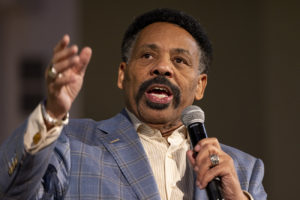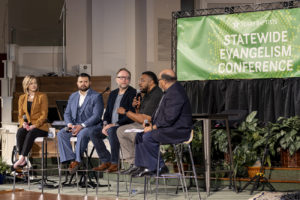Conference offers training and equipping in evangelism
SAN ANTONIO—Saying the church’s “evangelism has fallen short of our calling,” Pastor Tony Evans urged attendees at Texas Baptists’ Statewide Evangelism Conference to go and make disciples.
The Jan. 23 conference saw 1,125 pastors, lay leaders and other attendees registered for a time of equipping and training at First Baptist Church of San Antonio.

Likening the gathering to a huddle in a football game, Evans reminded congregants that the conference was not the main objective, but rather a time to come together and strategize.
What’s important is “what difference the huddle makes,” Evans said. “Having huddled, can you now score?”
Evans, the senior pastor of Oak Cliff Bible Fellowship in Dallas, exhorted Christians not to join in the “chaotic conflict” of the culture by joining a team, but to be more like referees— representatives of God, with his authority.
He urged attendees to make disciples—which he defined as “visible, verbal” followers of Jesus who “replicate the Master”—and to take what they had learned in the evangelism conference and spread the gospel.
“The church is good at huddling,” Evans said. “But (Jesus) said, ‘I want you to go!’”
The Jan. 23 event—with the theme “Can I Ask You a Question?”—was Texas Baptists’ first statewide evangelism conference following a 15-year hiatus.

Large crowds filled the worship center for each of the seven sessions. Along with sermons and presentations, the conference included a question-and-answer panel with speakers.
“That’s what this conference is about,” Leighton Flowers, director of evangelism for Texas Baptists, told attendees. “To equip you and train you, to give you tools, so you can go back to your churches and to your homes and spread the gospel to your friends and neighbors.”
The evangelism conference’s theme is shared by a five-book curriculum bundle, published by GC2Press, with the same name: “Can I Ask You a Question?”
The curriculum teaches Christians the basics of sharing the gospel and engaging nonbelievers, noting Jesus often asked questions to further spiritual conversations.
‘The desire of every generation’
Katie McCoy, director of Women’s Ministry for Texas Baptists, outlined the post-Christian environment in which Texas Baptists now bear witness. Today’s culture resembles that of first-century Roman culture, McCoy said. That creates undeniable challenges but provides tremendous opportunity for Christ followers, she added.
McCoy said the prevailing cultural way of life inevitably leaves people isolated, searching for significance and hungering for wholeness.
“The message of Jesus and the community of his people are the desire of every generation,” she said.
But McCoy also warned conference-goers to focus on what is important—proclaiming the gospel. The early church, even as it was still developing, “kept the main things the main thing,” she said.
Be the ‘salt of the earth’
Eric Hernandez, apologetics lead and millennial specialist for Texas Baptists, emphasized the need to couple the ability to defend the faith with the practice of sharing one’s faith.
Beginning with Jesus’ words from Matthew 5:13—“You are the salt of the earth”—he asked attendees: “Why are you a Christian? Why should someone else be a Christian?”
In 2 Corinthians 10:3-5, the Apostle Paul teaches Christians are to “refute arguments and reasonings and every proud and lofty thing that sets itself up against the knowledge of God.” Hernandez posited that “the biggest threat to Christianity” is not atheists or other external opponents, but instead Christians “who cannot effectively engage in spiritual warfare by recognizing, rationally responding to and tearing down strongholds.”
Hernandez encouraged attendees to participate in the [un]Apologetic Conference, scheduled Feb. 25 in San Marcos.
“Let us not just learn to present the gospel, but defend it, because, ‘You are the salt of the earth.’ God has not just given us the truth but given us the evidence to show why it is true,” he said.
Issue a ‘broader invitation’
Robert White, lead pastor of Freedom Church in Bedford, implored attendees to issue a “broader invitation.” While Christians must proclaim the gospel, the invitation to Christ is “broader than just the words presented,” because it includes the example of their lives, he said.
“Before we can invite others to respond to the invitation, we need to accept the invitation that has been given to us to live like Jesus,” White said.
Preaching from Philippians 1:27-30, he exhorted Christians to gospel conduct—living lives worthy of the gospel—and to live in “gospel community” with each other.
He also called Christians to gospel confidence, noting there is no reason for fear, and to gospel commitment, recognizing that following Christ will mean suffering for the sake of Christ (Philippians 1:29).
Focus on those ‘on the outside’
Steve Bezner, senior pastor of Houston Northwest Church, called pastors to emphasize evangelism and to break out of a “chaplain” mindset, believing “our primary job is simply to care for those who are inside our churches.”
“We can easily forget that there are so many on the outside who do not have life in Christ,” he said. “Let’s be honest. If we don’t think about it, who will?”
Houston Northwest Church has experienced a surge in baptisms, he said, as the church has emphasized corporate prayer in recent years. Noting Gallup research projects fewer than 50 percent of Americans will identify as Christian by 2050, he exhorted pastors not to forget the power of the gospel.
“The world may be falling apart, the culture may be confused, things may be terrible in your neighborhood right now, but guess what?” Bezner said. “Jesus still saves. The cross still forgives. The empty tomb still promises eternal life. And Jesus is still pouring out his Holy Spirit on the most heathen among us.”
Next generation looking for authenticity
Shane Pruitt, National Next Gen Director for the North American Mission Board, urged attendees to focus on reaching Gen Z and then send them to reach their peers.
Despite statistics that show Gen Z identifies less with religion than previous generations, Pruitt said, he has seen more conversions among young people in the last three years than in his previous 15 years of ministry. The pandemic, he said, brought them “to the end of themselves” more rapidly than those in previous generations.
“You don’t have to be young. You don’t have to be cool,” he said. “Young people are not looking for cool leaders. They’re looking for real and authentic leaders. If you have the gospel, you have what it takes.”
Pruitt encouraged leaders not to refer to young people as the “future of the church.”
“They are the church now, and they can handle” the responsibility of fulfilling the Great Commission, he asserted.